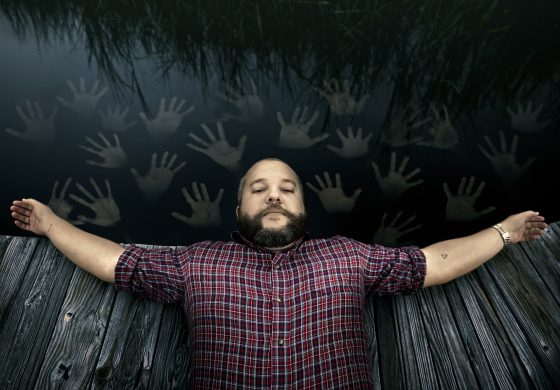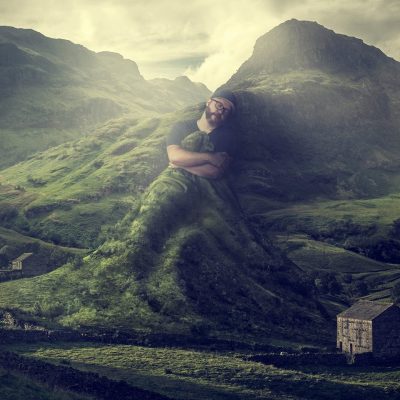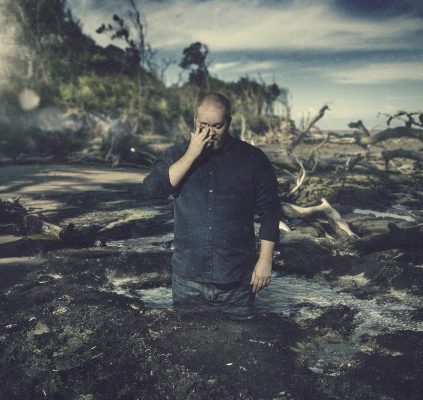
Ben Cooper is amazingly well adjusted. The force behind Radical Face grew up in south with nine siblings. Barely above the poverty line, his mixed-race family seemed normal, until he realised that not everyone was brought up the same way he was. Coming out to his parents that he was gay at the age of fourteen, his stepfather kicked him out of his house. By nineteen he had written two books, yet when his computer crashed he lost everything and turned to music. As an adult he discovered his stepfather sexually abused his niece, whom he adopted and gave testimony at his stepfather’s trial. Taking all that into account, the cuts and bruises he’s adorned with on the cover of his new EP Therapy make a lot of sense. The EP comes on the back of the Family Tree series – a trilogy of albums formed of The Roots, The Branches and The Leaves. For Folk’s Sake caught up with Ben to talk about his background and his inspiration.
Family Tree, let’s talk about that. It took up five or six years of your life.
Eight.
Eight, oh my gosh!
Yes
I’m curious about the concept. What was it about the Family Tree concept that got you started on all of that?
Well it was a funny thing, for both an extrinsic and intrinsic reason. The intrinsic reason, I have always wanted to be a writer. When I was out of school I wanted to write novels. I wrote two books after high school, and I wrote two books in high school and I lost them in a hard drive crash.
This is a kind of momentum for me. And this is what I thought I would do, and like a year and half one morning was just gone. They were short books. I was 19 and they were probably not good. You didn’t know at that time. I was really proud of them and so it kind of disappeared, but one of the things that I wanted to write about was a family saga. I was particularly inspired by books like One Hundred Years of Solitude. A decision made by one family member might show up two generations down the road. It was such an interesting concept and then the intrinsic reason is I was trying to understand my own family. It is just a complicated, messy dysfunctional thing. Being children, growing up in a mixed race family in the south. Nothing about it was simple. So I started writing about it. You know how you kick a nerve when you keep writing?
I think I wound up during the year doing the initial writing and over 60 songs came out. I kind of narrowed that down to 45. I didn’t start with this big lofty idea in mind. I was going to do 3 EPs and do five or six songs to show that idea, or three very short albums. Eight years … whoops … it was really an accident. It wasn’t something that was schemed.
You also have the EP, Family Tree: The Bastards, that came in between the albums.
There are some parts of the overall concept, even some the songs that ended up being the best. It had nothing to do with how happy I was with them. It was building an arc. I was trying to think of it as a story you’re telling. When I listened to them they didn’t seem to fit in with the others. However I was trying to tell the story, them just didn’t seem to fit. I could not make them work. They were a little awkward, a little malformed.
You have nine brothers and sisters. I’m curious how much of The Family Tree was really about your family.
It’s a funny thing, for a long time I had a lot of trouble with autobiographical music. Writing about myself I found I really didn’t have any sympathy. The problem is if I write my point of view things don’t go on. I became antagonistic to myself, I was sympathetic in making some odd material. I came up with a trick. If I removed all the details in the pieces that boil down to people’s experiences and put that experience into a character vehicle or vessel, then I could approach it with sympathy. I think it happens to a lot of people that if I think about my issues there are some things that my friend will tell me the same thing and I will feel terrible. Just separating myself allowed me to talk about it from the outside. I knew I was talking about people I know and was related to, and I was getting it off my chest and I was speaking directly to another person.
I found comfort later in realising that people like David Bowie were doing this. I read in some interview, he was saying that this is why he came up with Ziggy Stardust, he was embarrassed with his own ambition and his own voice. He decided that those flaws are part of that person and are important. When he tried to do it as himself he was ashamed. That’s how he dealt with his own embarrassment and the general narcissism of any musician or artist of any kind.

Between the last Family Tree album and your new EP, Therapy, you put out an interesting set of cover songs by Dolly Parton, The Cranberries, Cyndi Lauper, Prince, Sinead O’Connor and Memory from “Cats.” What motivated all of that?
The simplest way to explain this is I moved recently. I’ve moved a lot. I moved six times in under three years. That just complicated life things. By the time I was done moving I was out of practice with producing my own music. I was putting the side work for my money into making my own things. It was a challenge to get into making my own music, so I decided to go after some nostalgia, predominately female voices, dealing with them because I was not thinking how to say things, only how to do more songs. Three of those I played live for years and never laid down. It was kind of a way to shake the dust off as a producer.
I was going through the photo gallery on your website the other day and there was this photo where you appear like a giant Rip Van Winkle lying on the side of a mountain. I was wondering what that was about.
I pull a lot of ideas out of fairy tale stories. It is directly from the family. I just like the imagery. If I am every stuck I go to storybooks I like and images that I use. You can kind of just borrow them and people don’t notice that much. I guess you figured it out.
What about the image where you’re up to your hips in water and muck?
That was from a very weird experience, I was just stepping into a puddle that was a lot deeper than I assumed. It was super funny to me and it was an image that just stuck. There is a meaning there, you don’t just jump into something where you don’t know the depth. It was kind of a joke at the time that I was dealing with the whole Family Tree experience. I had no idea what I was about to do, but it became a joke. I stepped into the wrong puddle I guess.

Missing Film is a series of instrumental pieces. What motivated that? Was it just an opportunity to do some things without words?
Yes, and I definitely do some writing of that kind for commercials. I can use the sales and then don’t have to worry about my records as much, which is a rule that I have. I can just feel free to chase the idea completely. If I’m worried about the success I just cut the needs from it constantly. Usually I decide to work and build up and when I have stuff going financially then I just make the record. If nobody buys it I don’t have to worry about how I’ll eat. With this one I just started writing out to a movie trailer that didn’t work out. I was talking to a film maker, saying that the music can be such a sticking point. When you go to these libraries that are royalty free, really cheap and all. Some commodities are not there. It just doesn’t have a lot of mood. It’s just generic.
It doesn’t have a lot of mood. Some of it is really cheesy. I worked in advertising for a number of years, so I know how really, really bad those things can be.
Yes, you know that first hand. Technically it is a song, but I feel less than nothing, wondering what to do. I really like the idea of just letting it be with people and I was curious to see what people can do with it. It has been really fun seeing the videos and seeing the different ways it can be interpreted.
The new EP, Therapy comes out soon. Was that motivated by your own therapy.
Yes, I have been doing a lot of therapy. It is not a clever title.
Sometimes you have to be direct.
I think direct is the call of the day.
So you went through all this therapy and it seems like you came to all these different places.
A lot of music for me is compulsion, something happens and I just start to write about it. This one didn’t start as Therapy. It started as me trying to write in normal formats again. The original title was Verse Chorus. I wasn’t sure I could write that way anymore. So the music came first. I just needed to do it. But when the subject matter came up it made sense. And I recorded each song two different ways. There is a produced version and a stripped down version. There is going to be a second EP, much more traditional interpretations, strings, guitar, piano. It’s a fun experiment for me, can I write a song that is flexible and can I push it in any direction and still have it work? I ended up, after moving, with the therapist twice a week, just to sort out all the bad stuff that happened repeatedly. Nothing else in my mind. I was trying to write the words. I was kind of like this is what I think about. I didn’t have any thoughts recently. This is what I have, so I decided no characters this time. No guitar. I will just go ahead and do it myself. In many ways it is really uncomfortable. It’s definitely more comfortable telling a story than my own story, but I was glad I did it.
In what way was it uncomfortable? I’m curious. It seems to me it’s easy to use myself as the subject because I know myself better than anyone else.
That absolutely makes sense. When I know I am writing about myself, which I know I can be objective about. It is my own point of view. I don’t have to verify or debate about it at all. I think there is a lot of hiding in blind spots until you can stop.
I get it, when we kind of go “Oh my God, I can’t believe I just did that!”
I’m doing the song and it got easier when I went to make a first couple when it was just things i did real quickly, and then when I found a comfort spot I was okay. I always joked that as a songwriter I am not talented or physically attractive enough to be honest. I think you must be an amazing musician to be a bullshitter. I am only pretty good at a lot of stuff so I have to race pretty hard on content and having that honesty.
On the new record you have some incredible lines that present amazing images, like on ‘Better Days’, “your head is pouring gasoline on the person you prefer to be.”
That’s the self-sabotage thing. I think some of us in some ways deal with that part of yourself that sabotages your success, that you are uncomfortable with. The whole thing was just talking to a therapist and honestly just hearing conversations with your former self like you are stuck on it, because normally your parent would have done this, or someone with their upbringing. Sometimes you have to say it to yourself. That’s what I wrote after that and what would I say to myself? That one didn’t know how to get out of it. I am sorry that came about.
Where do you fit in your family tree?
I am third from the top, two older sisters and 7 younger brothers and sisters. It’s so funny. You can’t see outside of your own experience. Anything you draw is just normal. Sometimes it doesn’t feel good, feel connected, but you don’t have a comparison. You don’t feel how it is and then later you get the comparison and see it is different and there are pros and cons to all of it. Equally, I cannot understand an only child. There’s just you and nobody watching you, that’s terrible in some way. I didn’t have my own room until my twenties. You are never the centre of the universe. If anything you are wondering if you have any values at all. I had to do my own laundry when I was eleven, there was something I would adjust to. It was always that way, some of it was easier, you start realising it is an anomaly. Some of the scale and some of the experiences were a kind of knowledge. There were some things not done by other people. You don’t get this ability. It definitely forms what you do. I think I had a sense of earlier reality than a lot of people. I was used to a big family, a very dysfunctional family with a lot of problems. I wasn’t way above the poverty line, just kind of a whole mess. Plus, it was an 859-square-foot house, like a two bedroom home, so it was definitely not a well thought out plan.
In a poor neighborhood, a predominately black neighborhood. There was no place to turn. It was like either side was not cool, too. I had bricks thrown through my windows and all kinds of stuff, girl stuff. And then I came out when I was 14. When I came out I got kicked out at age 14. When I got to deal with just my own problems it was great. It is still harder than it sounds, but I can go to a therapist. I couldn’t go to a therapist with other people. There is no choice at that age, so you just try to deal with it. A lot of times you don’t have time to know what it all means, you just get by and try to be as normal as possible.
It’s amazing to me that you were able to get through it all.
You know it feels more that way to see it as an adult. I’m like what the hell is going on. Like having a court case with some family members and sexual abuse, and I had to take two kids. It was a bunch of stuff. And you’re handing a police report. It was two papers from the police who were watching and why didn’t mum do anything. It’s like just words. Not having any comparisons to look upon. I had very good friends, these parents were ok and let me stay in their house all the time and during the summer I would be there a week straight.
Music for me is a way of honestly understanding the way of looking at humanity. Music has been a refuge. I can be a personal refuge and also private. One of the best things about music is it’s relate-ability. I can listen to a song from a different country and still understand.
